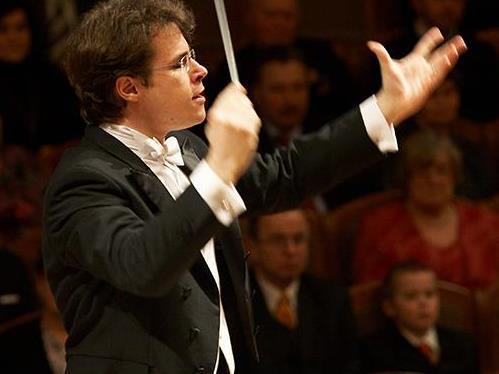Conductor Jakub Hrůša
I expected Dvořák from the Sydney Symphony but got some Elgar instead, which is not how their concerts usually go. Usually, the blurb that one reads on the back of a ticket (you can be bored sometimes) states that the organisation reserves the right to change the advertised program however they see fit, but they never do. (Although one does wonder what would happen if a classical concert was turned into a rave – how that might be taken legally.) Changing the order of the pieces, maybe, but rarely the pieces themselves. Nevertheless there was a rather good reason for the change from one famous cello concerto to another equally famous one: the cellist, Norwegian born Truls Mork, suffered a minor injury earlier in the year, and while we’re assured that he is very much improved, he has had to readdress the number of pieces he is performing at the same time. Which, as it turns out in the grand scheme of all things musical, is rather fortuitous, for the Sydney Symphony played the Dvořák concerto only a couple of years ago, whereas it’s been 2008 since the Elgar got an airing.
And what a concerto it was. Those in the audience no doubt would have been expecting nothing less, especially given the conservative nature of the concert title – ‘Romantic Masterpieces’ – with the most newfangled object in the room within a hundred years being the printed program. But the Elgar clearly holds a special place in our vital stuff, with it being voted as the fifth most popular concerto in the ABC’s Classic 100 Concerto Countdown in 2007. We like it. We adore it, even. And this performance proved us right. Sitting amiably centre stage with Czech conductor Jakub Hrůša on his left, Mork proved himself a congenial but heartfelt presence in the Sydney Opera House Concert Hall, with a graciousness of tone and rapid engagement that made for a charismatic and connecting performance. Hrůša, too, pulled the best from the orchestra, giving us each swell and eddy of Elgar ‘s score as if it was just emerging from his head right then, and if there is a sure sign that a performance is hitting its target, it is this improvisatorial quality that gives the illusion of something never heard before – the process of hearing something old but hearing it ‘fresh’. The audience, suitably appreciative, got a return on their applauding investment, with Mork giving an encore in the shape of the Sarabande from Bach’s Cello Suite No.2 in D Minor, itself a wonder.
Before all that came five Hungarian dances of Brahma, orchestrated from the original piano by Dvořák. (So we were to get some Dvořák anyway, assuming we had been pining for him.) 21 were the dances that Brahms wrote for the piano, and they were all orchestrated when his publisher farmed them off to little known composers to do their best with. Dvořák was the best and most known on the list at the time, and his version of dances 17-21 are the only ones that have graduated into the regular repertoire. Hrusa gave a stunning performance of these, full of energy and enthusiasm that the usual overture can sometimes lack, with each morsel going down fabulously well.
After the interval was that monument of Brahms’, his fourth symphony, but unfortunately this critic, overexposed to it as he is – not from any dislike of the piece, mind you – found it quite lacklustre at times, with none of the freshness present in the concerto or vim in the dances. It was a performance marked by attention to the overall shape of each movement’s structure at the expense of the individual moments, although there was enough inertial bluster that one never found things too tedious – just not particularly enlivening. But it is a rare concert that is masterful the entire way through, so the afternoon was still a success.Rating: 4 out of 5 stars
Romantic Masterpieces: Brahms & Elgar
Sydney Symphony
Conductor: Jakub Hrůša
Cello: Truls Mork
Johannes Brahms – Five Hungarian Dances No.17 – No.21 (orchestrated by Antonin Dvorak)
Edward Elgar – Cello Concerto in E minor, Op.85
Johannes Brahms – Symphony No.4 in E minor, Op.98
Concert Hall, Sydney Opera House
www.sydneysymphony.com
12 July





